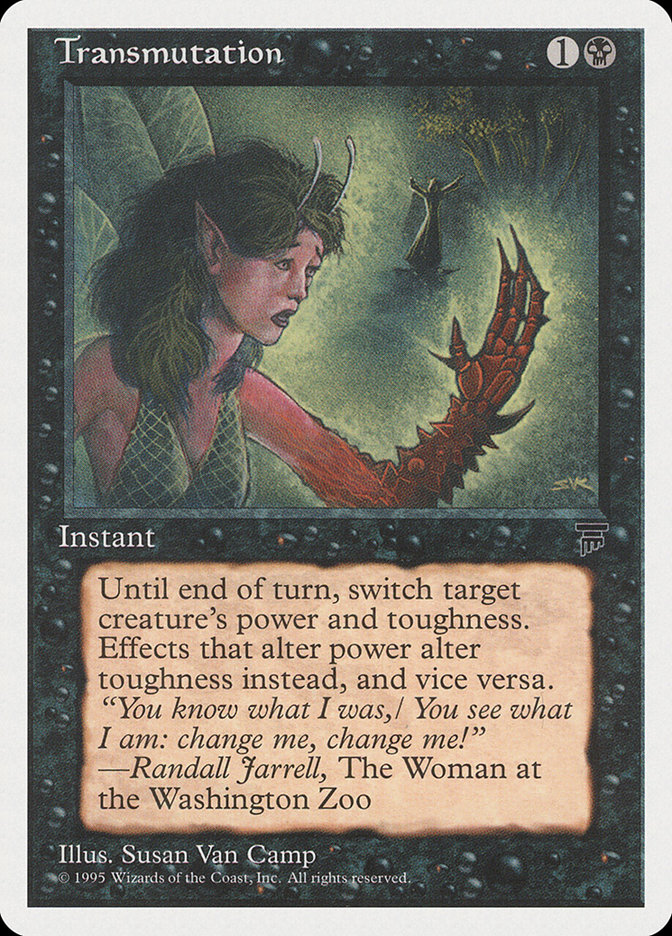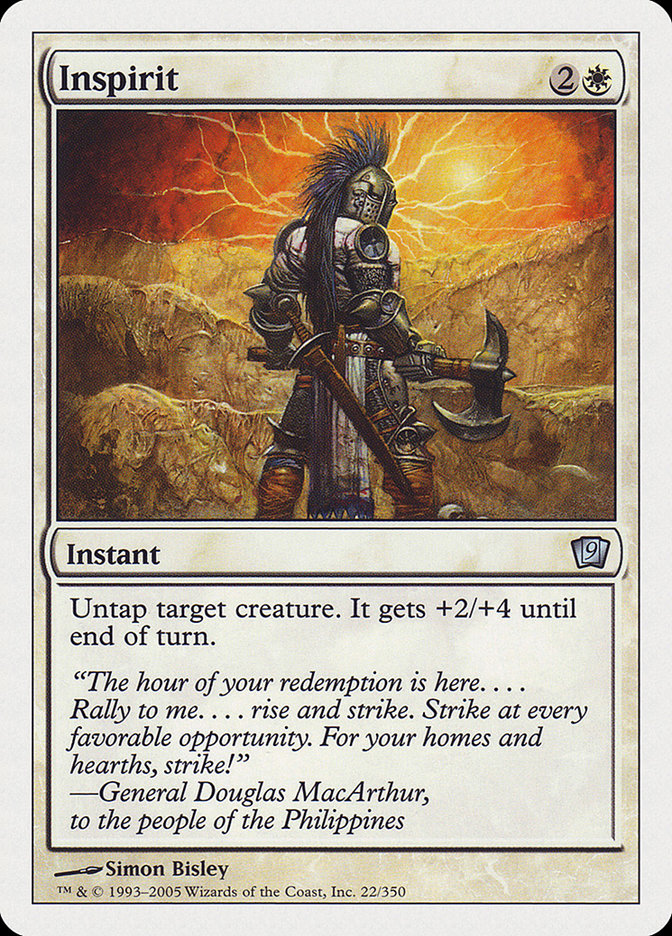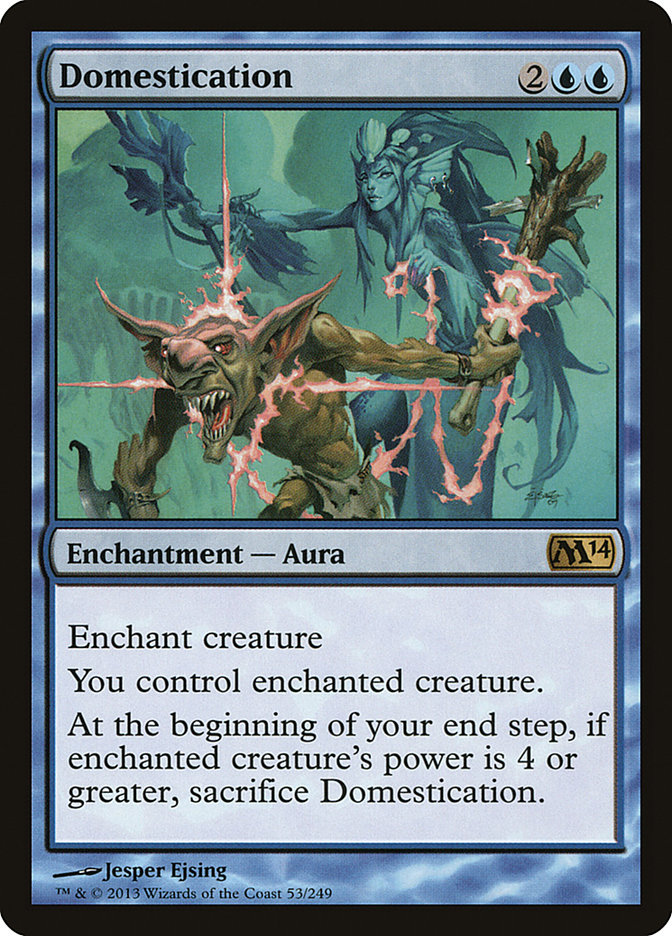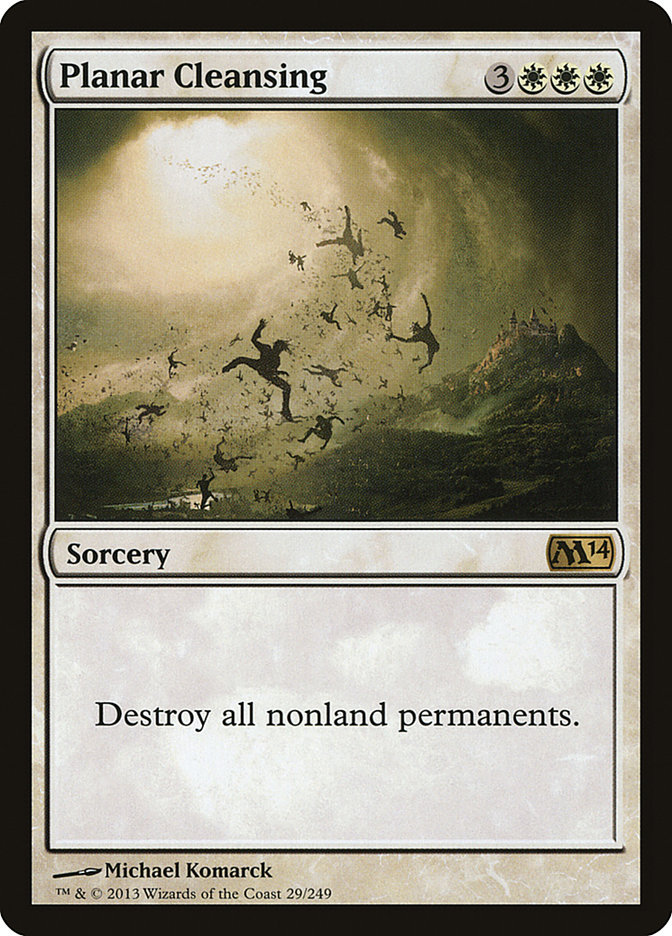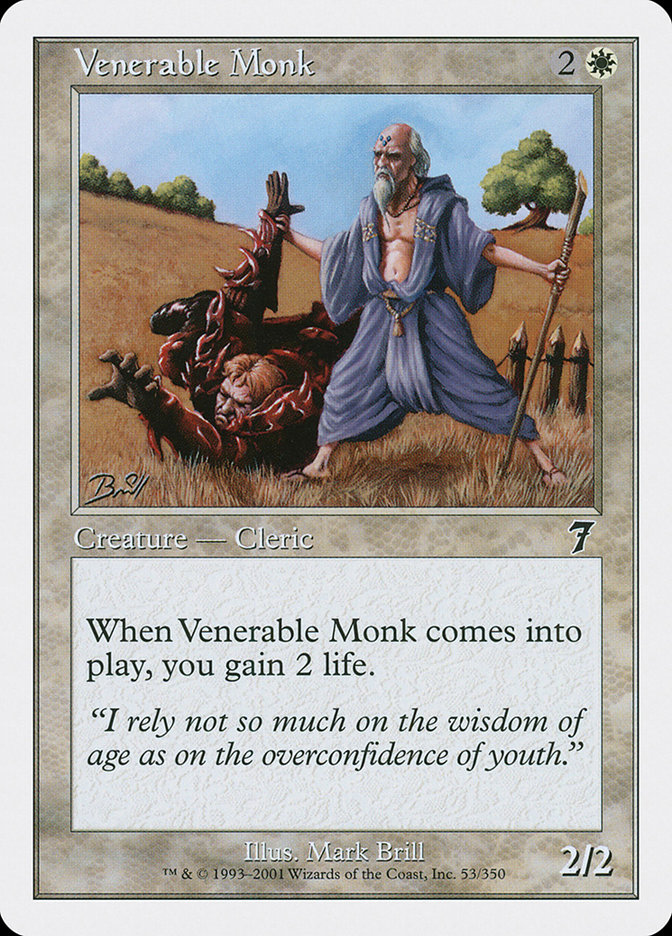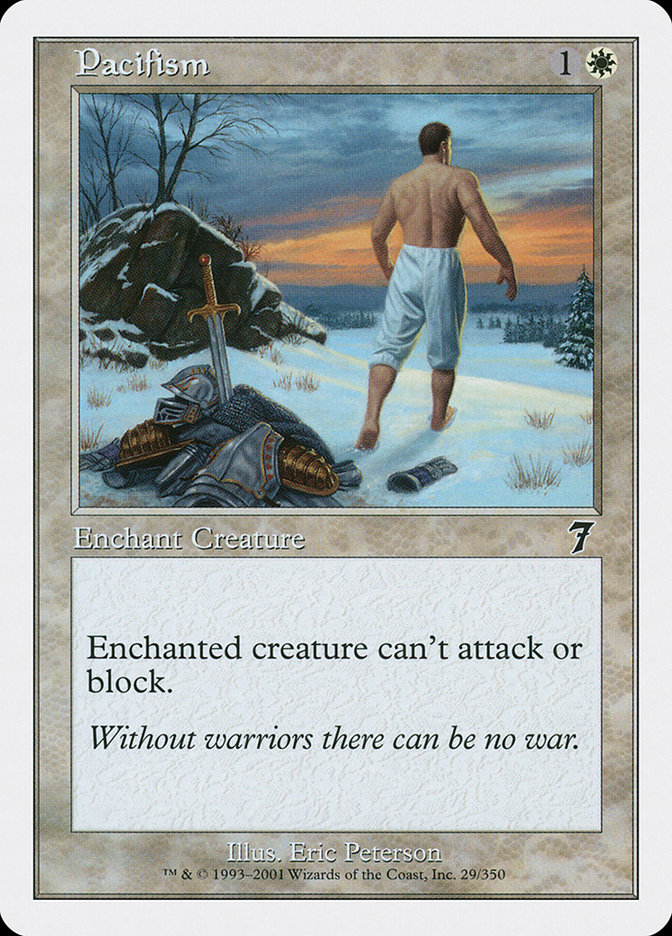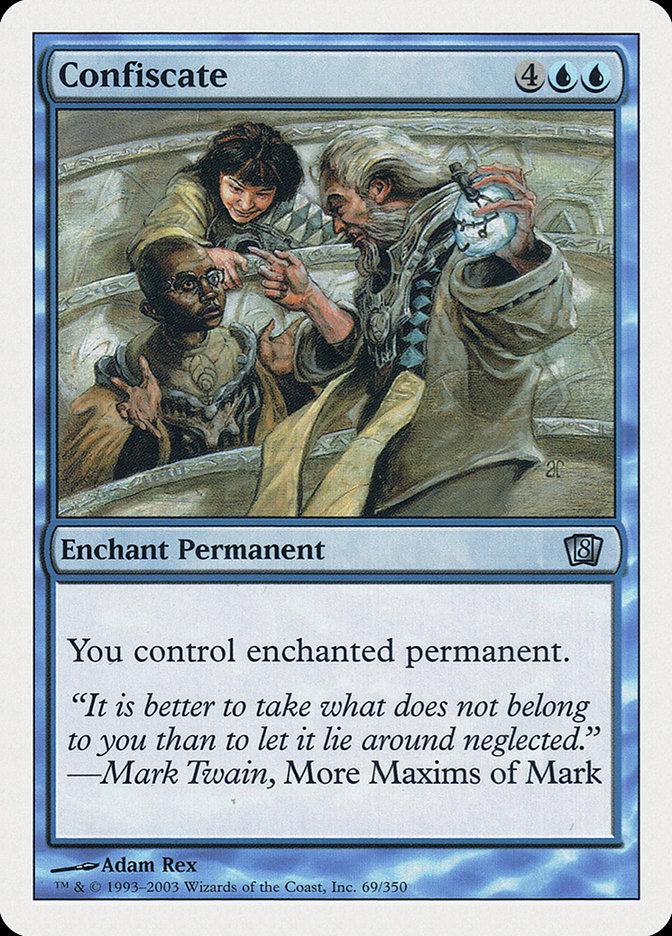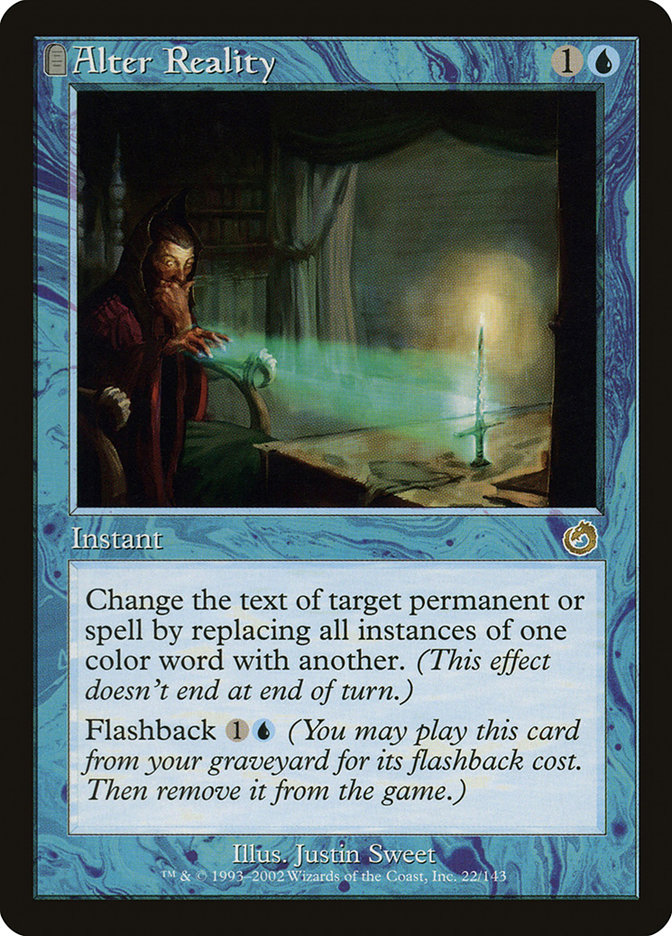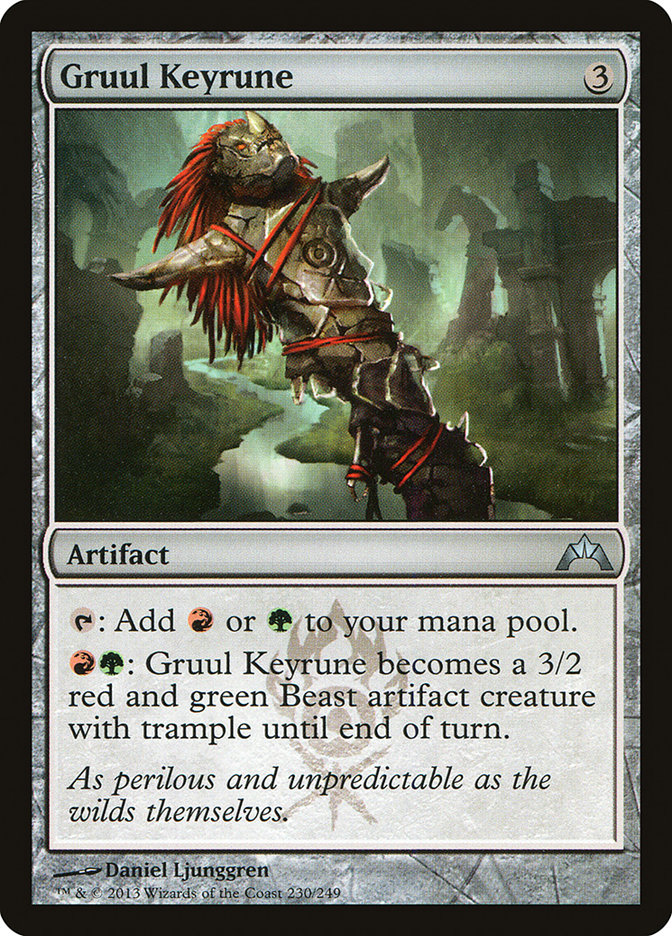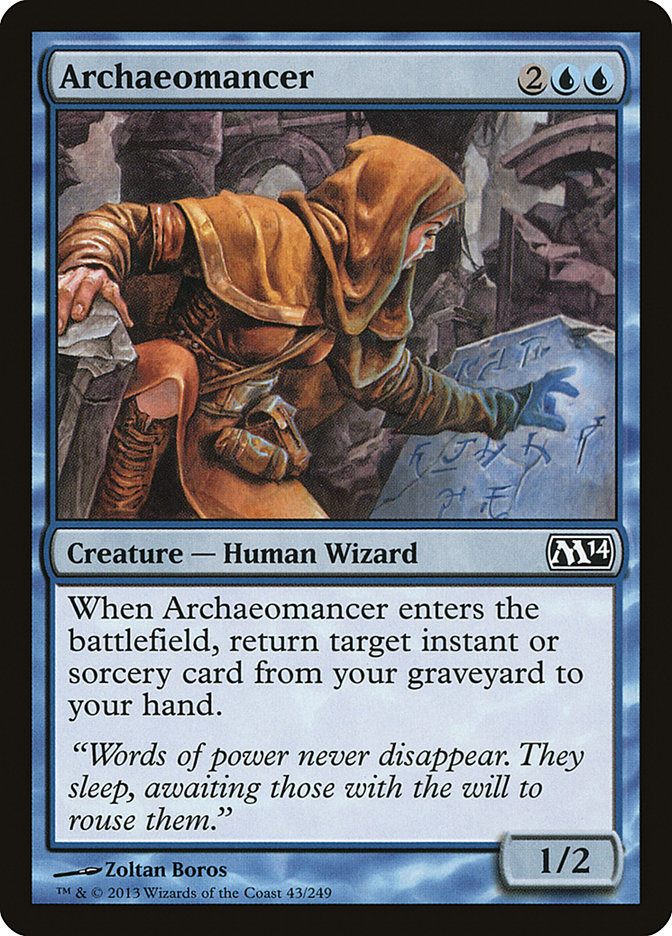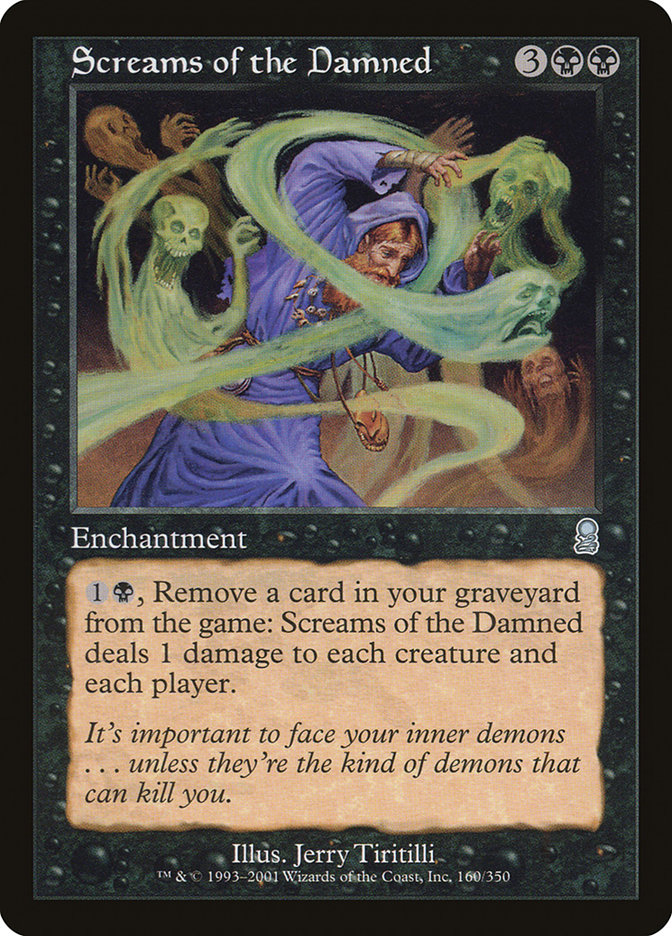Recently I had occasion to research public-domain quotes. Because of copyright law I had to stop my search at those authors who died in 1943 and before. I have a love-hate relationship with copyright as it stands in the United States. When I’m writing for myself (that is, not work-for-hire like this article), it is in theory my protector and ally. I find that as a reader, though, the current system has gone horribly wrong. A work remains under copyright for the life of its author and another 70 yearson top of that, a lifetime and a lifetime. The Supreme Court has ruled that this is constitutional; as someone who values the public domain, I question its wisdom.
The rules are the rules, though, no matter how I may wish them to be. Wizards of the Coast is bound by them, too; when it places real-world quotations on Magic cards, those rules must be obeyed. There have been mistakes such as Transmutation (in which Randall Jerrell’s “The Woman at the Washington Zoo,” a poem first published in the 1960s, got quoted) and corner-cases such as the 9th Edition version of Inspirit (which quotes General Douglas MacArthur’s 1944 speech as he returned to the Philippines; MacArthur at that time was being paid by the United States and so his speech might make sense possibly being in the public domain, but I’m not a lawyer). By and large, though, the rules are pretty strict: dead 70 years or no quotation.
Tsk, tsk!
Fortunately for real-world flavor text devotees, as the years pass, the work of more and more authors falls into the public domain, ready for quotation. Thanks to Wikipedia’s many pages, one may see who died in any particular year and extrapolate from there when the author’s published-during-lifetime work will fall into the public domain; for example, in 2011, several of the works of James Joyce, whose estate had been guarded strictly until then, joined the public domain in the United States 70 years after his death in 1941. (Anyone who’s tried to read Finnegans Wake will be glad to know that work is ineligible, but the short stories of Dubliners are wide open.) As time goes on, more and more authors’ words will become available for free quotation.
How will Magic’s real-world flavor text options expand in the future? It would be impossible to fit into a single article the names of every worthy author or other notable-quotable who died in a certain year and I shall not try. Instead, for each of the next ten years, I shall highlight a single quotable individual whose work shall enter the public domain — and thus be quotable on Magic cards being shaped in that year (to be published the next) — and give some ideas for the types of cards to which they are suited. It starts with a good one, 2014/1944…
2014 / d. 1944: Antoine de Saint-Exupéry
This French count, a pilot and master of prose, could make words and wings soar with equal ease. His reputation rests largely on a single beloved work: The Little Prince. Ah, but what a work! For me, as for many writers and other lovers of books, reading The Little Prince was an experience unlike any other: simple enough for the child-me to understand, powerful enough to make grown-me weep.
The Little Prince is rich in quotable quotes. Consider what the fox says to the Little Prince: “You become responsible, forever, for what you have tamed.” Wouldn’t that make a killer quote for Domestication or a white card that carries themes of responsibility?
Then there’s a line I keep in my home office: “Language is the source of misunderstandings.” If a core set card ever were named Lost in Translation, how perfect would this be? More broadly, I could see the language quote applied to a few counterspells.
It is perhaps too much to ask to see a reprint of Oasis, but if ever there were, it should bear these words: “‘What makes the desert beautiful,’ says the little prince, ‘is that somewhere it hides a well.'”
The one quote from The Little Prince that could fit on the most cards, though, is perhaps the most famous of all: “It is only with the heart that one can see rightly; what is essential is invisible to the eye.”
2015 / d. 1945: Franklin Delano Roosevelt
Skipping certain other political leaders who died that year for what I hope are obvious reasons, FDR, the longest-serving U.S. president, is my pick for 1945. His famous fireside chats and other speeches are eminently quotable.
There’s something wonderfully Izzet about his words on political experimentation: “If it fails, admit it frankly and try another. But above all, try something.” Of course, those sentences could hang in any artificer’s workshop. Hmm… Compulsive Research, perhaps?
While it requires ellipses on both the front and back ends, the most iconic phrase from FDR’s first inaugural address rings true: “…the only thing we have to fear is fear itself…” Show of Valor would fit, as would any number of white cards.
Players of Civilization V will recognize this next one as that game’s flavor text for the Fertilizer technology: “The Nation that destroys its soil destroys itself.” While Mana Severance is unlikely to make a comeback anytime soon, the right land-destruction or land-sacrifice spell would work well.
My last FDR quotable would have to be shortened somehow, but I will let it stand here in all its magnificence: “I have seen war. I have seen war on land and sea. I have seen blood running from the wounded. I have seen men coughing out their gassed lungs. I have seen the dead in the mud. I have seen cities destroyed. I have seen two hundred limping exhausted men come out of line – the survivors of a regiment of one thousand that went forward forty-eight hours before. I have seen children starving. I have seen the agony of mothers and wives. I hate war.”
2016 / d. 1946: H.G. Wells
One of the all-time great writers of imagination, British author H.G. Wells was responsible for The Time Machine and many other works long held as classics.
I could well imagine a black card — make it a demon — skewering righteousness with these arch words from Wells: “Moral indignation is jealousy with a halo.”
Any number of green cards could use this gem from late in his life: “Adapt or perish, now as ever, is Nature’s inexorable imperative.”
Somewhere between blue and green, but not quite Simic, is this line from The Island of Doctor Moreau: “The study of Nature makes a man at last as remorseless as Nature.”
Then there is the theme of distance. Rather than a Distant Melody or Distant Memories, if there were a Distant Calamity or a Distant Atrocity, I can think of few better flavor texts than this: “How small the vastest of human catastrophes may seem at a distance of a few million miles.”
2017 / d. 1947: Willa Cather
An author known for her fiction set among American pioneer families, Willa Cather is a staple of secondary-school reading lists in the U.S.A. and a writer I still read for the sheer enjoyment of it.
Though One of Ours is among her lesser-known works today, it won Cather a Pulitzer Prize. It’s also the source of a beautiful quote: “The dead might as well try to speak to the living as the old to the young.” A promotional version of Midnight Haunting could have great resonance, as would any number of cards, existing and to come, relating to either the living and the dead or the old and the young.
When I saw a certain quote from O Pioneers!, I had the card name “Founder of Nations” (nonexistent… so far!) pop into my head: “The history of every country begins in the heart of a man or a woman.”
Another line from O Pioneers!, well-suited to many green cards: “We come and go, but the land is always here.”
I don’t know where to place these words from The Professor’s House, but I have a few thoughts in mind: “The heart of another is a dark forest, always, no matter how close it has been to one’s own.”
2018 / d. 1948: Mahatma Gandhi
Noted proponent of nonviolence and leader of India’s independence movement. After an assassin cut short his life in 1948, the Nobel Peace Prize, which had not found him in life, went unawarded that year.
In a 1919 leaflet, he wrote this wisdom which might have certain characters in the color white nodding along: “Victory attained by violence is tantamount to a defeat, for it is momentary.”
Similarly, this quote from a 1931 interview has strong resonance: “The weak can never forgive. Forgiveness is the attribute of the strong.”
In 1940, he wrote for one of his newspapers: “It is unwise to be too sure of one’s own wisdom. It is healthy to be reminded that the strongest might weaken and the wisest might err.” This has a counterspell feel to me.
The most stick-the-landing use for a Gandhi, quote, though, would be on Pacifism, specifically: “Nonviolence is the first article of my faith. It is also the last article of my creed.”
2019 / d. 1949: Will Cuppy
Tired of punning or other humorous flavor text that misses the mark? Will Cuppy is here to save the day. A master of acerbic wit, the Indiana-born Cuppy cultivated a curmudgeonly persona and it paid off for him.
Hmm, which cards to skewer? How about Birds of Paradise? This line Cuppy originally wrote about the hummingbird seems apropos: “The male is colored much more gorgeously than the female so that he can be shot and made into feather embroidery.”
Then there’s this comment that could apply to any number of Cobra cards in Magic: “A few Cobras in your home will soon clear it of Rats and Mice. Of course, you will still have the Cobras.”
Confiscate already has received the Mark Twain treatment, but here’s the Will Cuppy take: “Borrowing has a bad name, but you would be surprised how it helps in a pinch.”
I’ll wrap up the Will Cuppy section with this counterspell-worthy quote: “Ah, well! We live and learn, or, anyway, we live.”
2020 / d. 1950: George Orwell
Perhaps your idea of dystopia in high school was reading Orwell’s dystopian works rather than experiencing them. Either way, the author of secondary-education classics Animal Farm and Nineteen Eighty-Four is plenty quotable.
There are plenty of cards in white that could gain from Orwell’s note on the question of Indian independence, “Either we all live in a decent world, or nobody does.”
Animal Farm’s infamous revision of “All animals are equal” would fit well on a “leader” animal, especially if there were a Boar-lord of sorts: “All animals are equal but some animals are more equal than others.”
The bad side of blue’s control-freak nature surely would appreciate a chance at certain lines from Nineteen Eighty-Four. There’s “‘Who controls the past,’ ran the Party slogan, ‘controls the future: who controls the present controls the past.'”
Similarly, Magical Hack-style cards could use this quote from the same source: “Everything faded into mist. The past was erased, the erasure was forgotten, the lie became truth.”
2021 / d. 1951: Sinclair Lewis
Another U.S. writer, a Nobel Prize winner who (like most U.S. literature awardees) routinely skewered the capitalist way of life. He accepted that prize but turned down a Pulitzer.
A card reflecting good fortune might benefit from a few words from his Nobel Lecture: “Fortune has dealt with me rather too well. I have known little struggle, not much poverty, many generosities.”
There’s something of the Gruul in this line from his novel Babbitt: “I hate your city. It has standardized all the beauty out of life.”
A longer line from his dystopia, It Can’t Happen Here, is well-suited to a card representing a steadfast rebel once truncated as necessary: “Under a tyranny, most friends are a liability. One quarter of them turn ‘reasonable’ and become your enemies, one quarter are afraid to speak, and one quarter are killed and you die with them. But the blessed final quarter keep you alive.”
Because so many of the memorable Lewis quotes reference U.S. life, they are not applicable to Magic, but this line from the last novel published in his lifetime, The God-Seeker, is wonderfully flexible: “I have faith in Faith, I have reverence for all true Reverence.”
2022 / d. 1952: George Santayana
Spanish-born American philosopher, today best known for a certain quote and a name-check in Billy Joel’s “We Didn’t Start the Fire.”
An early quote from The Sense of Beauty, slippery for now but sure to be a great fit for the right card: “Theory helps us to bear our ignorance of fact.”
His iconic quote is from The Life of Reason: “Those who cannot remember the past are condemned to repeat it.”
This one from The Genteel Tradition in American Philosophy is just begging to go on a blue-white card: “Eternal vigilance is the price of knowledge.”
Santayana is endlessly quotable, but I’ll conclude with this one, which may or may not be accurate depending on the natures of the planeswalkers nearby: “Only the dead have seen the end of war.”
2023 / d. 1953: Eugene O’Neill
American playwright, Nobel Prize winner, well-known for devastating (if long) works such as The Iceman Cometh. His masterwork, Long Day’s Journey into Night, was published posthumously and so is ineligible for quotation in 2023.
From The Hairy Ape: “Be as artificial as you are, I advise. There’s a sort of sincerity in that, you know.” Perhaps a line for an artifact creature?
I haven’t found many real-world quotes for black, but this one from Mourning Becomes Electra is just brutal: “Don’t cry. The damned don’t cry.”
From Days Without End: “One may not give one’s soul to a devil of hate — and remain forever scatheless.” With the recent influx of devils into Magic, this one could get some play in red.
A late and less-known play, A Moon for the Misbegotten, has at least this line to redeem it: “There is no present or future, only the past, happening over and over again, now.”
Wrap-Up
As the years go on, more and more authors’ works will be available for the real-world portion of Magic flavor text. The days of dozens of Earth quotes in a single core set are long past, but it’s reassuring to know that there will be a steady supply of famous lines to add mind-spice.
Join me in two weeks, when I’ll talk about postmodern literature, the inner workings of the circulatory system, or Magic. Probably Magic.
— JDB

